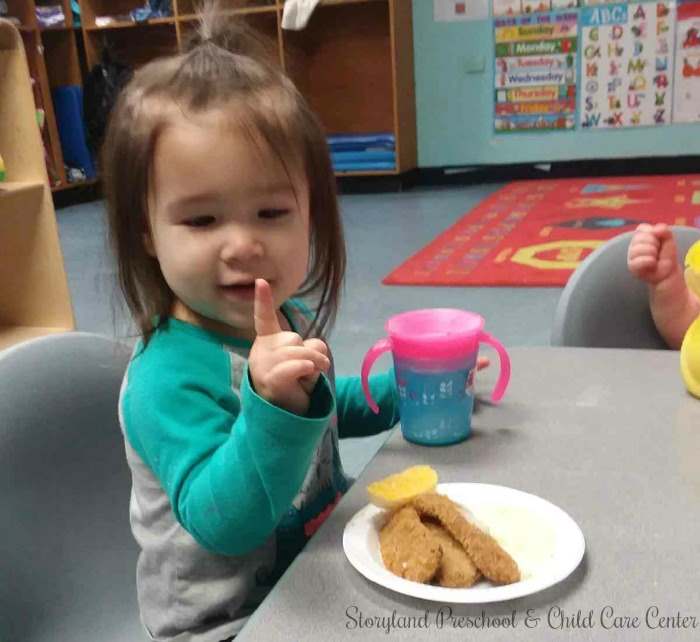Our Toddler Program
 The Toddler Program at Storyland Preschool and Child Care Center
The Toddler Program at Storyland Preschool and Child Care CenterChildren enter our toddler program when they are comfortably walking and are completely on table food. All four of our toddler rooms are designed with the growing child, looking especially at the physical, social, emotional and cognitive needs of our children ages 12 to 36 months.
Toddlers may be the busiest students in our building – they are a bundle of energy, a natural part of growth and development. We channel that energy into programs designed especially for toddlers.
Toddler Program Activities
Toddlers may be the busiest students in our building – they are a bundle of energy, a natural part of growth and development. We channel that energy into programs designed especially for toddlers. Focusing on motor skills, both large muscle and small motor skills, we provide activities that will build muscle and coordination, dexterity and overall good health.
We emphasize language development, encouraging each child’s growing vocabularies and understanding of our language. Stories are a large part of the curriculum and story time is enjoyed in large group, small group and on one with a caring adult.
Children enjoy music and movement, dancing and singing, art and creative pursuits and dramatic play. Their cognitive development is encouraged through the use of small group projects and activities geared at helping them learn about their world and many different basic skills are taught including math, science and social studies.
Age appropriate activities encourage children to learn self-help skills while building their social and emotional competencies.
All of our programs encourage active learning in a secure, nurturing environment. Children participate in a wide range of activities including sand play, books and reading, painting and art, manipulative play, indoors and outdoors, weather permitting.
Even at this age, we encourage children to become familiar with our preschool concept so our rooms are divided into general interest areas or centers. Potty training is encouraged as well as good oral care, health and hygiene.
Our Goals for Our Toddlers
Social and Emotional
1. Learns to know and Trust caring adults
2. Regulates own behavior
3. Manages own feelings
4. Responds to others’ feelings with growing empathy
5. Plays with other children
6. Learns to be a member of a group
7. Uses personal care skills
Physical Development
8. Demonstrates basic gross motor skills that are age appropriate
9. Demonstrates basic fine motor skills that are age appropriate
Cognitive Development
10. Sustains attention
11. Understands how objects can be used
12. Shows a beginning understanding of cause and effect
13. Shows a beginning understanding that things can be grouped
14. Uses problem-solving strategies
15. Engages in pretend play
Language and Communication
16. Develops receptive language
17. Develops expressive language
18. Participates in conversations
19. Enjoys books and being read to
20. Shows an awareness of pictures and print
21. Experiments with drawing and writing